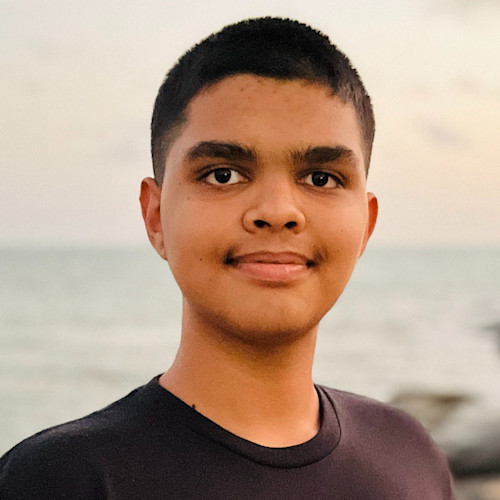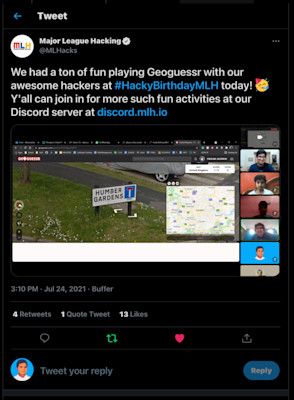Kanha Korgaonkar, 16

Kanha Korgaonkar has loved his hacking journey. Although only actively involved in hackathons for a year, they have assumed a special role in his life. He has a passion for tech and a desire to bring others in to share his excitement, making him a valuable community member.
Kanha got into technology very early. His father taught him to create an HTML webpage in 3rd grade, and he was programming in C before he finished middle school. It was a dream. He says, “Computer science felt almost magical to me. I was amazed how a few lines of code could make me a colorful website or do my complex math homework problems in a few minutes!”
He credits hackathons for making computer science exciting and practical. He says much of the CS curriculum in his native India focuses too much on theory, which dissuades students from even considering it as an elective. Hackathons bring knowledge to life, and he wants to showcase them to everyone. He has a goal, he says, “to get [his] school friends and as many other people as possible into hackathons!”
Throughout his schooling, he was involved in computer science and saw an ad for a hackathon in one of his massive open online courses. He saw it for what it was – a chance to apply his HTML, CSS, and CS fundamentals to hands-on projects. He signed up immediately. DefHacks Worldwide 3.0 was his first hackathon, leading him to sign up for over 50 more in the next year. His team of fellow beginners built a calendar app that won a sponsor’s prize, showing him how collaboration and hard work could produce results.
After several events, Kanha discovered Major League Hacking (MLH) and his first introduction to its hackathons: Hacky Birthday MLH. He described it as the most fun event yet, exposing him to a new world. He enjoyed “the mini events, streams and hacker hangouts, the support from mentors, cutting edge software for free from MLH’s sponsors and cool stickers and swag! And, for the first time in my life, I found a welcoming, inclusive and empowering community I could truly fit right in!”
His focus shifted from trying to win to supporting others in collaboration. Because he was participating in so many hackathons, his network was growing exponentially. He began to see his role shift from competitor to mentor. Even though he was new to the process, he knew he could help others. He says, “I realized that mentors didn’t have to know everything, but someone who is on Day 2 of their hackathon journey can be a very valuable mentor to someone who is on Day 1.” Kanha understands the power of community, being able to lift others and guide them.
This mentoring push led him to lead his first guild, Maverick Mooshroom (now Makerspace), at Global Hack Week: Learn, Global Hack Week: Build, and Global Hack Week: Share. He continues to evolve, even organizing a hackathon himself, FreyHacks, that became an MLH Member Event and a nonprofit, fiscally sponsored by The Hack Foundation. It promotes STEAM and introduces hacking to diverse audiences.
Kanha understands the importance of giving back. He says, “As a hacker myself, I understand that great mentorship at the right time can be the difference between a hacker submitting a project or not, which is why I am really proud of what I do.”
Quick Facts

Kanha Korgaonkar, 16

Kanha Korgaonkar has loved his hacking journey. Although only actively involved in hackathons for a year, they have assumed a special role in his life. He has a passion for tech and a desire to bring others in to share his excitement, making him a valuable community member.
Kanha got into technology very early. His father taught him to create an HTML webpage in 3rd grade, and he was programming in C before he finished middle school. It was a dream. He says, “Computer science felt almost magical to me. I was amazed how a few lines of code could make me a colorful website or do my complex math homework problems in a few minutes!”
He credits hackathons for making computer science exciting and practical. He says much of the CS curriculum in his native India focuses too much on theory, which dissuades students from even considering it as an elective. Hackathons bring knowledge to life, and he wants to showcase them to everyone. He has a goal, he says, “to get [his] school friends and as many other people as possible into hackathons!”
Throughout his schooling, he was involved in computer science and saw an ad for a hackathon in one of his massive open online courses. He saw it for what it was – a chance to apply his HTML, CSS, and CS fundamentals to hands-on projects. He signed up immediately. DefHacks Worldwide 3.0 was his first hackathon, leading him to sign up for over 50 more in the next year. His team of fellow beginners built a calendar app that won a sponsor’s prize, showing him how collaboration and hard work could produce results.
After several events, Kanha discovered Major League Hacking (MLH) and his first introduction to its hackathons: Hacky Birthday MLH. He described it as the most fun event yet, exposing him to a new world. He enjoyed “the mini events, streams and hacker hangouts, the support from mentors, cutting edge software for free from MLH’s sponsors and cool stickers and swag! And, for the first time in my life, I found a welcoming, inclusive and empowering community I could truly fit right in!”
His focus shifted from trying to win to supporting others in collaboration. Because he was participating in so many hackathons, his network was growing exponentially. He began to see his role shift from competitor to mentor. Even though he was new to the process, he knew he could help others. He says, “I realized that mentors didn’t have to know everything, but someone who is on Day 2 of their hackathon journey can be a very valuable mentor to someone who is on Day 1.” Kanha understands the power of community, being able to lift others and guide them.
This mentoring push led him to lead his first guild, Maverick Mooshroom (now Makerspace), at Global Hack Week: Learn, Global Hack Week: Build, and Global Hack Week: Share. He continues to evolve, even organizing a hackathon himself, FreyHacks, that became an MLH Member Event and a nonprofit, fiscally sponsored by The Hack Foundation. It promotes STEAM and introduces hacking to diverse audiences.
Kanha understands the importance of giving back. He says, “As a hacker myself, I understand that great mentorship at the right time can be the difference between a hacker submitting a project or not, which is why I am really proud of what I do.”
Quick Facts




